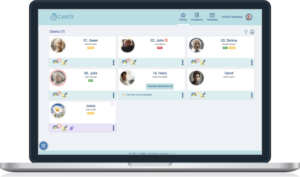Perhaps the biggest pain that registered managers in any service suffer is that of trying to get staff to engage in record keeping and to do so in real time. As a senior carer or manager, perhaps you have had more junior staff ask the question “why do I have to write it down” while making the observation “it does not make the care any better”, some just don’t get the point of record keeping.
What can you say to this apparently reasonable piece of logic? How do you explain to the reluctant writer that record keeping is as much part of their job as anything else they do?
 The best place to start is with the old chestnut “if you did not write it down, you cannot prove you did it”. While this is not 100% true, it is true enough to use as a means of starting to show the reluctant writer that they have to record the care they give.
The best place to start is with the old chestnut “if you did not write it down, you cannot prove you did it”. While this is not 100% true, it is true enough to use as a means of starting to show the reluctant writer that they have to record the care they give.
Then one needs to identify who they need to prove it to. A list that contains the CQC, or other regulator, the coroner, the police and justifiably angry family members is a good place to start.
Of course, any senior or manager would hope that the need to involve these people in the life of the service is a rare occurrence and look for a more prosaic answer. The need for record keeping comes from the need to provide person-centred care. How so?
rare occurrence and look for a more prosaic answer. The need for record keeping comes from the need to provide person-centred care. How so?
Person-centred care, one of the CQC fundamental standards https://www.cqc.org.uk/about-us/fundamental-standards, is care which is provided when all staff, including those who don’t really know the service user, are able to provide the care that a person wants, needs and would choose consistently regardless of the time of day – we know this as continuity of care.
This is achieved by creating good quality care plans based on robust assessments undertaken with the individual and recorded for all future carers to access. The usefulness of these care plans is constantly evaluated by carers who record the delivery of care, how that care was received by the service user and whether the goals of care were achieved.
Quite simply without recording care care is disjointed, plans of care are unevaluated and service users suffer as a result. If they still don’t get it, perhaps they are in the wrong job…
Of course, some people are reluctant to write about the care they give because they struggle with reading and writing, so senior staff need to ascertain this and do what they can to mitigate this.
One way is to use digital care planning which is both easier to read and easier to complete. Some apps, like the care and support app in CAREis can be completed using voice to text technology, https://www.careis.net/features/. This means care staff who struggle with writing are able to record what they have done by talking, this speech is then converted to text, and the care plan is complete.
have done by talking, this speech is then converted to text, and the care plan is complete.
Another benefit of electronic record keeping is that it is quicker to do and more accessible than paper records. So, when challenging the reluctant carer, seniors and managers need to look to their services means of record keeping and ask the question as to whether digital record keeping might save them all that pain. Often it will and the time spent changing over will pay dividends in the short to medium term.
